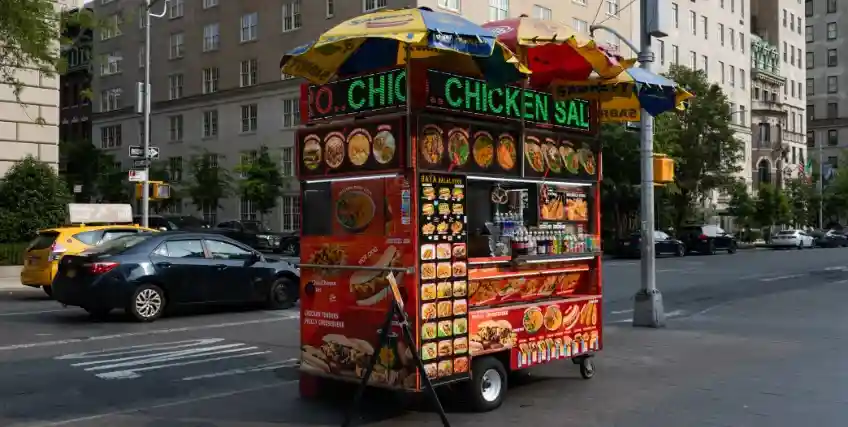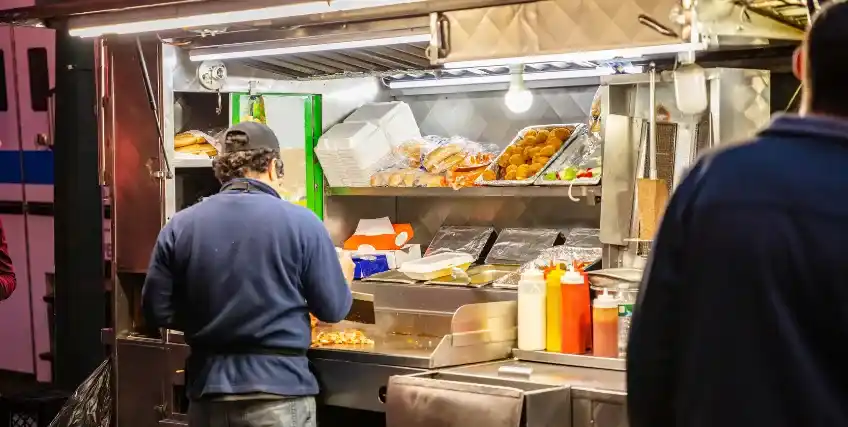Looking for Business Financing?
Apply now for flexible business financing. Biz2Credit offers term loans, revenue-based financing, lines of credit, and commercial real estate loans to qualified businesses.
Set up a Biz2Credit account and apply for business financing.
Key Takeaways
-
Food cart financing helps food truck and food trailer owners cover startup costs, kitchen equipment, and working capital needs.
-
Lenders require a strong credit history, a detailed business plan, and accurate tax returns when applying for food truck small business loans.
-
Compare various loan options such as SBA loans, microloans, equipment financing, and lines of credit to ensure better repayment terms and lower interest rates.
The food truck business is booming across the United States. According to IBISWorld, the food truck industry revenue is expected to reach $2.8 billion, with an annualized growth rate of 13.2% over the next five years.
Many entrepreneurs now dream of launching their own food business, one that blends creativity, independence, and mobility. But even a small food cart requires funding. From purchasing cooking equipment to managing cash flow, expenses add up quickly.
Small business owners can use food truck financing options to get the boost they need to turn their culinary ideas into a profitable small business. In this guide, we’ll see what food cart financing is, how it works, popular loan options, and tips to qualify even with bad credit.
What Is Food Cart Financing?
Food cart financing is a funding option that helps business owners fund a food cart, food trailer, or foot truck setup. This business financing option covers everything from kitchen equipment and licenses to fuel and marketing costs.
Unlike traditional restaurants, food trucks or carts require a smaller upfront investment. However, startup costs can often range between a few hundred dollars to several thousand dollars, depending on the size, location, and menu.
Entrepreneurs with limited savings can look for various food cart financing options including:
- Small business loans
- SBA loans
- Equipment loans
- Business lines of credit
- Microloans
Therefore, each loan option serves a specific need, from purchasing kitchen equipment to improving working capital.
Why Food Cart Financing Matters
When starting a mobile food business, small business owners need to have a strategic preparation. They must pay for permits, vehicle upgrades, and insurance. But without proper funding, even talented chefs can struggle to scale operations.
With food cart financing options, business owners can:
- Buy necessary kitchen equipment like grills, fryers, ovens, and refrigerators.
- Manage cash flow during slower months.
- Handle upfront expenses, such as down payments, renovations, or other business improvements.
- Expand business locations and reach new customers through social media and events.
Types of Financing Options for Food Carts
Since every small business is unique, different financing options for food cart serve different purposes. So, let’s explore some of the most common types of loans:
- SBA Loans
- Term Loans
- Business Lines of Credit
- Equipment Financing
- SBA Microloans
SBA loans are backed by the U.S. Small Business Administration, which guarantees a portion of the loan to reduce lender risk. These loans often come with lower interest rates, flexible repayment terms, and higher loan amounts than traditional financing.
How Food Truck Owners Can Use It: Food truck owners can use SBA loans to purchase a new truck or used truck, fund a food trailer, or cover startup costs. They can also use it for working capital, marketing, or upgrading cooking equipment.
A term loan is a traditional funding option that provides a fixed lump sum loan amount upfront. These loans can be repaid over a set period of time and come with predictable loan terms.
How Food Truck Owners Can Use It: Term loans can be used by food truck owners to buy a vehicle customize, kitchen layout, or purchase kitchen equipment. This loan type is also ideal for food truck for sale financing, helping business owners pay the full price upfront while spreading repayment over several years.
A business line of credit is a flexible funding option that works like a revolving credit card for businesses. Lenders approve a maximum credit limit, and borrowers can draw funds when they need. Also, the interest is charged only on the amount used.
How Food Truck Owners Can Use It: Food truck owners can use a business line of credit to access quick working capital. These loans can be used for short-term needs such as managing day-to-day expenses like inventory, fuel, and repairs without taking on new debt. Therefore, this option is particularly useful for business owners handling seasonal cash flow fluctuations or short-term funding gaps.
Equipment financing is a funding option designed for business owners to purchase or lease business equipment such as tools, tech, or machines. Instead of paying the full amount upfront, food cart owners can pay in easy monthly payments. Also, the equipment itself serves as collateral, reducing the credit approval risk.
How Food Truck Owners Can Use It: Food truck owners can use equipment financing to purchase essential cooking equipment such as a grill, an oven, or a refrigerator. These loans can also be used to upgrade old machinery. Since the equipment itself secures the loan, this food cart financing suits those with limited credit history or bad credit. Moreover, it also keeps more cash flow free for other operational needs.
An SBA microloan is a food truck startup funding option that offers smaller loan amounts to entrepreneurs. It typically ranges up to $50,000 and is offered through nonprofit organizations that support startups and small businesses.
How Food Truck Owners Can Use It: New food truck entrepreneurs can use an SBA microloan to fund early expenses like permits, down payments, or marketing. It’s especially helpful for those launching a food startup on a tight budget or needing funding for a small cart or food trailer setup.
Tips to Qualify for Food Cart Financing
The qualifications for food cart financing vary by lender and loan type. However, most lenders assess similar factors to determine loan eligibility.
Key requirements include:
-
Strong Credit Score: Having a credit score of 670 or above increases the chances of approval. Some lenders also consider personal credit if your business is new.
-
Solid Business Plan: Draft a detailed business plan before applying for food cart financing. The business plan should outline projected revenue, startup costs, and marketing strategies. This proves to lenders that your food truck business can manage debt responsibly.
-
Stable Cash Flow: Provide bank statements and tax returns to show financial consistency. A healthy cash flow ensures you can handle monthly payments.
-
Down Payment: Some loans require a down payment, especially for equipment loans or vehicle purchases.
-
Financial Documentation: Gather all the necessary documents including tax returns, bank statements, proof of business registration, and vendor invoices for kitchen equipment.
Key Factors to Consider Before Applying
Before submitting the loan application, evaluate the following points carefully:
-
Interest Rates: Compare rates from banks, online lenders, and SBA-approved institutions to find lower interest rates.
-
Loan Terms: Understand the repayment terms. Shorter terms usually higher monthly payments but less overall interest.
-
Loan Amounts: Borrow only what your business needs to maintain healthy cash flow.
-
Collateral: Some lenders require business assets, such as a truck or cooking equipment, as collateral.
-
Funding Speed: Alternative lenders offer faster decisions, while banks may take longer but provide better terms.
Risks of Food Cart Financing
While food cart financing supports business growth, every loan involves risks. High-interest rates or inconsistent cash flow can make repayment terms difficult to maintain. Borrowers should assess their revenue stability before committing.
Delays in monthly payments may hurt your credit history, limiting future loan eligibility. Always review every clause in your loan terms to avoid unexpected charges.
The Bottom Line
Starting a food truck business or food trailer venture can be a rewarding journey. Yet, like any small business, it demands financial planning. The right food cart financing options can help you handle startup costs, manage working capital, and expand operations without stress.
Take the time to understand each financing option, improve your credit score, and prepare a clear business plan. Doing so will increase your chances of securing funding from a reliable lender. Your next step? Review your funding options, compare loan terms, and explore SBA loans or equipment financing programs.
FAQs About Food Cart Financing
1. How do I qualify for food cart financing?
Most lenders review your credit score, business plan, and cash flow before approval. Having accurate tax returns and bank statements also helps prove your ability to repay. Even with bad credit, some lenders offer food truck financing with higher interest rates.
2. What loan options are available for food truck owners?
Food truck owners can explore SBA loans, term loans, equipment financing, microloans, and business lines of credit. Each option serves different needs, from buying cooking equipment to managing working capital. So, it’s better to compare interest rates and loan terms to choose the best fit for your food business.
3. Can startups get a food truck loan?
There are several financing options available for startup owners, including SBA microloans and equipment loans. These loans help cover startup costs, such as purchasing a food truck for sale financing or new kitchen equipment. However, having a solid business plan and proof of personal credit history may improve approval chances.
4. What documents do I need to apply for a food cart business loan?
Lenders typically ask for bank statements, tax returns, and financial projections. You should also include your business plan and proof of business registration. These documents help the lender assess your eligibility and repayment ability.
5. What are the risks of food truck financing?
The main risks include high interest rates, inconsistent cash flow, and strict repayment terms. Missing monthly payments can damage your credit history and make future borrowing difficult. To reduce risk, always borrow within your budget and compare loan options before committing.




